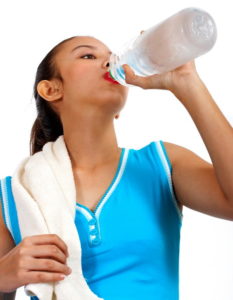What is Dehydration?

Around 70% of the human body is composed of water. Water helps our system to perform all its vital functions, including the transportation of blood. It aids in digestion, lubricates the eyes and mouth, and helps flush out toxic waste from the body.
Dehydration is a condition in which the body loses more water than it replaces. Normally, we tend to lose water from the body regularly. We lose some water in the form of water vapor as we exhale, but most water is lost as sweat, urine, and stool. Along with H2O, the human body contains a certain amount of salt (known as electrolytes).
Water and electrolytes together help the body perform all its vital functions. When excessive water is lost from the body, it can create an imbalance of electrolytes. This, in turn, can affect many all the vital functions of the human body.
Symptoms of Dehydration
One of the first symptoms is changes in the color of the urine. Clear urine is an indication that you are well hydrated. While darker urine indicates dehydration. The symptoms of dehydration vary with age. Infants often experience the following symptoms:
- A sunken fontanel – It is the soft spot in the middle of the skull
- No tears when crying
- Dry mouth
- No wet diaper for more than three hours
Infants are at a much higher risk of dehydration due to their lower body weight. While some of the symptoms of dehydration are the same in adults as in infants, others vary. Symptoms of dehydration in adults include the following:
- Dry mouth
- Fatigue/lethargy
- Headache
- Dizziness
As the condition progresses, it can lead to the following symptoms:
- Low blood pressure
- Increased heart rate
- Unconsciousness
Causes of Dehydration
There are many causes of dehydration. One of the most important causes is drinking less water. People are often so tied up with their schedules that they do not drink enough. Athletes or people who spend more time outdoors in warmer climates are also likely to suffer this condition.
However, there are some medical issues that can lead to this.
Diarrhea and Vomiting
In case of severe diarrhea and vomiting, the body ends up losing most of its fluids. This loss of water can lead to an imbalance of electrolytes in the body.
Fever
High-grade fever is another important cause of dehydration. The body tends to lose more water in cases such as this.
Increased Urination
Uncontrolled or chronic diabetes can lead to excessive urination and can cause dehydration.
How Does It Affect the Body?
Water is an integral part of the human body and there is a reason for it. It allows the body to perform all important functions including transportation of blood, brain function, attention, and excretion of toxic waste. According to research, even slight dehydration can negatively affect your mood, memory, attention, and coordination. Some of the effects of dehydration on the human body include the following:
Strains the Heart
Since water is an integral component of the blood, lack of water results in the thickening of the blood. When the blood becomes more concentrated, its volume reduces, and subsequently, your heart needs to pump faster to compensate for the missing liquid volume. This is the reason why dehydration results in a faster heartbeat, which can cause you to become lightheaded and even faint.
Affects Brain Function
Electrolytes play an important role in performing cognitive functions, including attention and motor skills. When the body is dehydrated, there is an imbalance of electrolytes and that can affect brain function.
Can Lead to Kidney Failure
Kidneys perform an important role in filtering out toxic waste from the body in the form of urine. When the body is dehydrated, it becomes harder for the kidneys to perform their functions. Severe dehydration can lead to a buildup of waste in the body, which can form clogs in the kidneys. This is the reason why dehydration is considered to be a leading cause of kidney stones and urinary tract infections.
Hampers the Body’s Ability to Regulate Temperature
The skin is one of the most vital organs when it comes to maintaining the body’s internal temperature. When the body temperature rises due to exercise, the skin allows the body to release excess heat in the form of sweat. When the body is dehydrated, it can affect the skin’s ability to regulate temperature. This can cause a condition known as hyperthermia, which is an overheating of the body.
Tips for Staying Hydrated
An average adult in a temperate climate needs between 2-3 liters of water every day. Now that you know how dehydration affects the body, here are a few tips for staying hydrated:
Keep a Water Bottle
Try and keep a bottle of water along with you all the time. A bottle at your desk, in the car or in your bag, and on the table will remind you to drink frequently throughout the day.
Add Natural Flavor
If you find plain water tasteless, adding natural flavors can help. A slice of lemon, few mint leaves, or berries can give color and taste to your water.
Start Your Day by Drinking Water
A few sips or a glass full of water as soon as you wake up will help you stay hydrated throughout the day. It is also one of the best ways to reduce excess body fat.
Add Fruits and Vegetables to Your Diet

Besides being an excellent source of nutrients, fresh fruits and vegetables including cucumbers, watermelons, berries, and oranges have high water content. Adding such fruits and vegetables to your diet will help replenish lost water from the body.
Other Forms of Water
No doubt, pure natural water is the best for your body, but drinking other liquids is not out of the question. Coffee, tea, juice, and milk (an excellent source of hydration) are great sources to keep your system plenished. Soda also, but be careful because they do have negative factors, such as weight gain.
And alcohol? Now that’s a loaded question (yes, pun intended). Be wary, some alcoholic drinks can cause dehydration, but there is more to it than that. Low alcohol drinks are better at hydration than high alcohol ones, so the best thing to do is make sure you are still gulping down that plain, fresh natural H2O when you go out to drink the happy juice.
